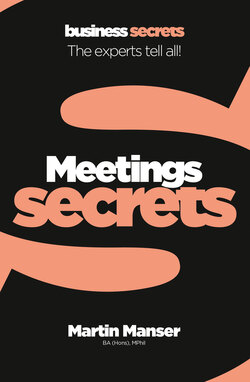Читать книгу Meetings - Martin Manser - Страница 15
2.1 Make the practical arrangements
ОглавлениеPreparation for a meeting is vital. What is the best time of day to hold it? For example, if you hold the meeting just before lunch then colleagues will want to finish punctually. If you hold it just after lunch they may be sleepy. Think what is the best time.
You also need to consider the venue:
▪ If you are holding a conference, will you need several rooms, e.g. one formal room to conduct the official business and a separate room for refreshments? Will you need rooms for breakouts, small discussion groups? Book the rooms you need as soon as possible.
▪ If you’re considering an external venue, e.g. a hotel, then choose one that is easily accessible to most of your participants. Arrange an appointment with the on-site conference manager to discuss your requirements and their facilities and prices. If the venue is away from your offices, then check car parking and access to public transport.
▪ If you are having an appraisal or are discussing a sensitive matter, then consider meeting at a neutral venue. Try to arrange the seating so that you sit at right angles to the person you are speaking to. Further, the chair you are sitting on should be at the same level as the person you are speaking to.
Also list the basics:
▪ How many participants are attending.
▪ How you want the seating to be laid out in the room. Examples: horseshoe (U-shaped) seating, if you want all participants to have good eye contact with one another; boardroom-style seating where participants sit around a long table; conference- or theatre-style seating in which speakers sit in a row in front of the audience; cabaret/restaurant-style seating for more informal occasions.
▪ Whether refreshments are needed and if so when and what; don’t forget special dietary requirements.
▪ The lighting and air-conditioning/heating of the room.
▪ Wi-Fi availability (e.g. password for access to the Internet).
▪ Other equipment that you will require.
▪ Facilities for those hard of hearing and/or with special access requirements.
▪ Accessibility to toilets.
case study Jane and Kate needed some quiet time to think through their strategy for a forthcoming project so they booked room A3 in their offices from 9.30 a.m. Unfortunately, they had only booked that room for an hour, so at 10.30 a.m., just as they were making good progress, some other colleagues interrupted them saying they had booked the room from 10.30 a.m. The lesson: check your arrangements.
These lists may seem unimportant but you only have to forget one detail to realize that working through a check list is essential.
